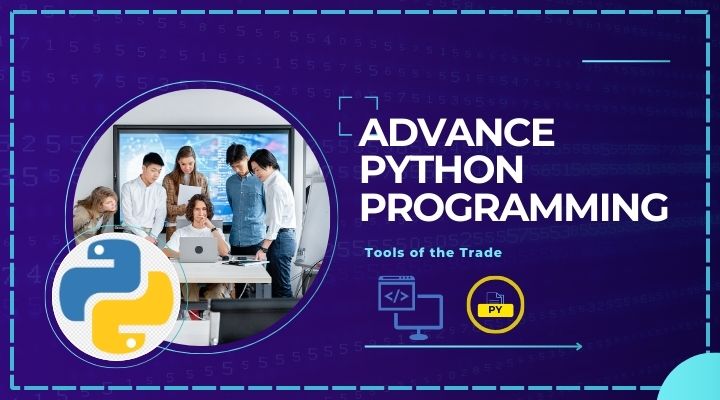
Advance Python Programming
Duration: 2 Months
Fee: 2500/- Per Month
This Python programming course is designed to provide a comprehensive introduction to Python, focusing on both theoretical concepts and practical applications. The course is structured to guide students from basic programming concepts.
Module 1: Introduction to Python
Lesson 1.1: What is Python?
- Overview of Python
- Python’s applications and industries
- Advantages of Python over other languages
- Installing Python and setting up the development environment (IDEs like VS Code, PyCharm, Jupyter Notebook)
Lesson 1.2: Python Syntax and Structure
- Python syntax basics (indentation and whitespace)
- Writing the first Python program (“Hello, World!”)
- Executing Python code (interactive mode vs script mode)
Module 2: Variables, Data Types, and Operators
Lesson 2.1: Variables and Data Types
- Variables in Python: definition, assignment, and rules
- Basic data types: integers, floats, booleans, and strings
- Type conversion (casting) between different data types
- Working with constants in Python
Lesson 2.2: Operators in Python
- Arithmetic operators (
+,-,*,/,//,%,**) - Comparison operators (
==,!=,<,>,<=,>=) - Logical operators (
and,or,not) - Bitwise operators (
&,|,^,<<,>>) - Membership operators (
in,not in) - Identity operators (
is,is not)
- Arithmetic operators (
Module 3: Control Flow and Loops
Lesson 3.1: Conditional Statements
- The
if,elif, andelsestatements - Nested conditions
- The
passkeyword and short-circuiting in logical operations
- The
Lesson 3.2: Looping Structures
forloop (iterating over sequences)whileloop (executing based on conditions)- Loop control:
break,continue, andelsein loops - Nested loops and iterating through lists, tuples, and dictionaries
Module 4: Functions
Lesson 4.1: Introduction to Functions
- Defining functions using the
defkeyword - Parameters and return values
- Default, keyword, and variable-length arguments
- Lambda functions (anonymous functions)
- Defining functions using the
Lesson 4.2: Scope and Lifetime of Variables
- Local and global variables
- The
globalkeyword - Function scope, argument passing, and mutability
Lesson 4.3: Recursion
- Understanding recursion
- Base case and recursive case
- Recursive function examples (factorial, Fibonacci sequence)
Module 5: Data Structures
Lesson 5.1: Lists
- Defining and manipulating lists
- List operations:
append(),extend(),remove(),pop(), etc. - List slicing and indexing
- Nested lists and list comprehensions
Lesson 5.2: Tuples
- Introduction to tuples (immutable sequences)
- Accessing and manipulating tuples
- Tuple packing and unpacking
Lesson 5.3: Dictionaries
- Defining and accessing dictionaries
- Dictionary methods:
get(),pop(),keys(),values(), etc. - Iterating over dictionary keys and values
- Nested dictionaries
Lesson 5.4: Sets
- Defining and manipulating sets (unordered collections)
- Set operations (union, intersection, difference, etc.)
- Set methods:
add(),remove(),discard(),clear()
Module 6: String Manipulation
Lesson 6.1: String Basics
- Creating and accessing strings
- String concatenation and repetition
- String indexing and slicing
- Escape sequences and special characters
Lesson 6.2: String Methods
- Common string methods:
lower(),upper(),split(),replace(),join(), etc. - String formatting techniques (f-strings,
format(),%formatting)
- Common string methods:
Lesson 6.3: Regular Expressions (Optional)
- Introduction to regular expressions
- Using the
remodule - Basic patterns and searching, matching, and replacing
Module 7: File I/O (Input/Output)
Lesson 7.1: Reading Files
- Opening and reading files using
open() - Reading content using
read(),readline(), andreadlines() - Working with different file types (text, CSV)
- Opening and reading files using
Lesson 7.2: Writing Files
- Writing to files using
write()andwritelines() - Appending to files
- The
withstatement for automatic file closing
- Writing to files using
Lesson 7.3: File Handling Techniques
- Checking if a file exists with
os.path - File and directory operations using the
osmodule - Working with CSV files using the
csvmodule
- Checking if a file exists with
Module 8: Error Handling and Exceptions
Lesson 8.1: Introduction to Exceptions
- What are exceptions?
- Built-in exceptions in Python
- Handling exceptions with
try,except,else, andfinallyblocks
Lesson 8.2: Raising Exceptions
- The
raisekeyword and custom exceptions - Using
assertstatements for debugging
- The
Lesson 8.3: Exception Hierarchy
- Exception class hierarchy and handling multiple exceptions
- Creating custom exception classes